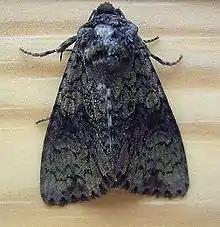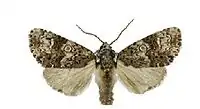| Coronet | |
|---|---|
 | |
 | |
| Scientific classification | |
| Domain: | Eukaryota |
| Kingdom: | Animalia |
| Phylum: | Arthropoda |
| Class: | Insecta |
| Order: | Lepidoptera |
| Superfamily: | Noctuoidea |
| Family: | Noctuidae |
| Genus: | Craniophora |
| Species: | C. ligustri |
| Binomial name | |
| Craniophora ligustri (Denis & Schiffermüller, 1775) | |
Craniophora ligustri, the coronet, is a moth of the family Noctuidae. The species was first described by Michael Denis and Ignaz Schiffermüller in 1775. It is found in Europe, through the Palearctic to Japan.
.JPG.webp)

Distribution
It is found from western and central Europe to the Russian Far East, northern China, Japan and Korea. In the north, the range extends to southern Scandinavia, the Baltic States and central Russia (approximately north to Saint Petersburg) as well as Ukraine. However, on the Iberian Peninsula, the species is limited to the north. In the eastern Mediterranean, it reaches northern Greece with smaller isolated occurrence in central Greece and the Peloponnese. The distribution area also includes Israel, Asia Minor and the Caucasus. It occurs in Cyprus.
Description
The wingspan is 30–35 mm. Its forewings are purplish fuscous, more or less greenish tinged, with a paler patch beyond the cell; prothorax conspicuously whitish. — ab. sundevalli Lampa is a form in which both forewing and thorax are entirely dark olive green. ab. nigra Tutt has the forewing black throughout, without any green tinge, and has only been taken in the North of England; lastly, in ab. coronula Haw. the white apex is suffused with grey brown instead of green, with a white lunule on its inner edge.[1] The white patch distal to the reniform appears to resemble a crown, hence the name coronet. Wing coloration and size is dependent on the environmental factor in which they grow as well as it is expected to be shown through physical differences and morphology.[2][3]
Biology
The moth flies from April to September depending on the location. The caterpillars feed on Fraxinus excelsior, common lilac and Ligustrum vulgare.[4]
References
- ↑ Seitz, A. Ed., 1914 Die Großschmetterlinge der Erde, Verlag Alfred Kernen, Stuttgart Band 3: Abt. 1, Die Großschmetterlinge des palaearktischen Faunengebietes, Die palaearktischen eulenartigen Nachtfalter, 1914
- ↑ CESARONI, DONATELLA; LUCARELLI, MARCO; ALLORI, PAOLA; RUSSO, FRANCESCA; SBORDONI, VALERIO (1994-06-01). "Patterns of evolution and multidimensional systematics in graylings (Lepidoptera: Hipparchia)". Biological Journal of the Linnean Society. Oxford Academic. 52 (2): 101–119. doi:10.1111/j.1095-8312.1994.tb00982.x. ISSN 0024-4066.
- ↑ Kiss, Ádám; Tóth, János P.; Varga, Zoltán (2017). "Male genitalia variability in Craniophora ligustri (Lepidoptera: Noctuidae: Acronictinae)" (PDF). Acta Zoologica Academiae Scientiarum Hungaricae. 63 (1): 1–15. doi:10.17109/AZH.63.1.1.2017.
- ↑ "Robinson, G. S., P. R. Ackery, I. J. Kitching, G. W. Beccaloni & L. M. Hernández, 2010. HOSTS - A Database of the World's Lepidopteran Hostplants. Natural History Museum, London".
External links
- Kimber, Ian. "73.047 BF2291 The Coronet Craniophora ligustri ([Denis & Schiffermüller], 1775)". UKMoths. Retrieved 26 October 2020.
- Savela, Markku, ed. (15 June 2020). "Craniophora ligustri (Denis & Schiffermüller, 1775)". Lepidoptera and Some Other Life Forms. Retrieved 26 October 2020.
- "Craniophora ligustri (Denis & Schiffermüller, 1775)". Fauna Europaea. Retrieved 26 October 2020.
- "08789 Craniophora ligustri ([Denis & Schiffermüller], 1775) - Liguster-Rindeneule". Lepiforum e. V. (in German) Retrieved 26 October 2020.
- [https://www.vlinderstichting.nl/vlinders/overzicht-vlinders/details-vlinder/schedeldrager "Schedeldrager
Craniophora ligustri"]. De Vlinderstichting. (in Dutch) Retrieved 26 October 2020.